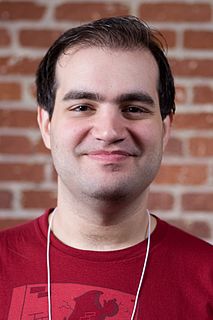A Quote by Agustin Fernandez Mallo
Today we understand that reality corresponds to a model - or, even better, the sum of various models - which in science are termed "complex systems" - not complicated or difficult, that's a different thing! This complexity is what creates that which we all know - the World - is connected in a system of networks - and I'm not referring only to the internet but also to thousands of analog networks in which we are all immersed at every instant.
Quote Topics
Also
Analog
Better
Complex
Complex System
Complex Systems
Complexity
Complicated
Connected
Creates
Different
Different Thing
Difficult
Even
Every
Immersed
Instant
Internet
Know
Model
Models
Networks
Only
Reality
Referring
Science
Sum
System
Systems
Thing
Thousands
Today
Understand
Various
Which
World
Related Quotes
The structure of the human brain is enormously complex. It contains about 10 billion nerve cells (neurons), which are interlinked in a vast network through 1,000 billion junctions (synapses). The whole brain can be divided into subsections, or sub-networks, which communicate with each other in a network fashion. All this results in intricate patterns of intertwined webs, networks of nesting within larger networks.
Because of the control of the media by corporate wealth, the discovery of truth depends on an alternative media, such as small radio stations, networks, programs. Also, alternative newspapers, which exist all over the country. Also, cable TV programs, which are not dependent on commercial advertising. Also, the internet, which can reach millions of people by-passing the conventional media.
If the system exhibits a structure which can be represented by a mathematical equivalent, called a mathematical model, and if the objective can be also so quantified, then some computational method may be evolved for choosing the best schedule of actions among alternatives. Such use of mathematical models is termed mathematical programming.
There is state-run television in Russia, which is more loyal to the state, as it always is with state television in any country. We have private owned networks; some of them are oppositional. We have thousands of regional networks that, in their regions, are more watched than the so-called federal stations.
There are certain concepts, which exist in English, and are unthinkable, untranslatable into Hebrew and vice versa. Hebrew has a system of tenses, which is, in a big way, different from the English system of tenses, probably different than any European system of tenses, which means a different sense of reality, which means a different concept of time. So, things can be translated, but they become different.
One can truly say that the irresistible progress of natural science since the time of Galileo has made its first halt before the study of the higher parts of the brain, the organ of the most complicated relations of the animal to the external world. And it seems, and not without reason, that now is the really critical moment for natural science; for the brain, in its highest complexity-the human brain-which created and creates natural science, itself becomes the object of this science.
The idea that hardware on networks should just be caches for movable process descriptions and the processes themselves goes back quite a ways. There's a real sense in which MS and Apple never understood networking or operating systems (or what objects really are), and when they decided to beef up their OSs, they went to (different) very old bad mainframe models of OS design to try to adapt to personal computers.
We live in a society right now which is the last phase of the ecosystem in terms of the old entertainment value, or the old entertainment construction, which is we've gone down to this instant gratification, instant numbers, instant understanding, instant. But it's like the exact - it has perfected itself to the instant click, when, in a way, creativity originates as a much more complex beast. So we now have to reinvent a new canvas where we can indulge in it. And that's where the digital revolution creates a whole new ecosystem of entertainment.
Every ecosystem, even a small one, is sustainable because it has certain ensembles and conditions and influences that are unique to it. And the biological ensembles are almost certainly, even the most modest ones, in the thousands of species. We don't know what's involved in the models - not even the beginnings. And yet we're trying to make a sustainable world, which has to include the natural world. The human species is triumphant, but it's got to get a grip. It's got to come to understand what's happened, why we're this way and what we're doing.
The stories leaders and others tell, few of which are true, are a lousy foundation on which to base any sort of science, and we know how to accomplish behavioral change and the importance of priming, informational saliency, and social networks. Producing inspiration and other good feelings doesn't last very long.





































